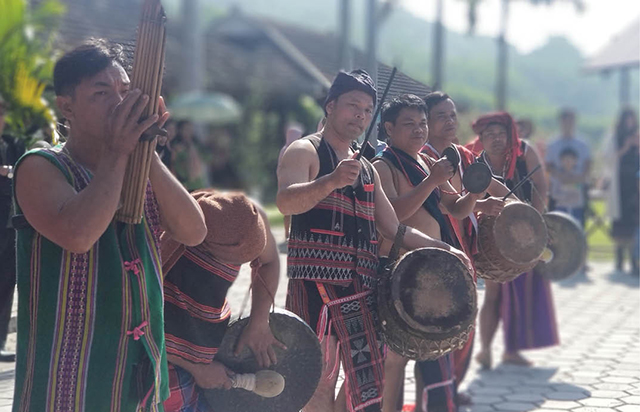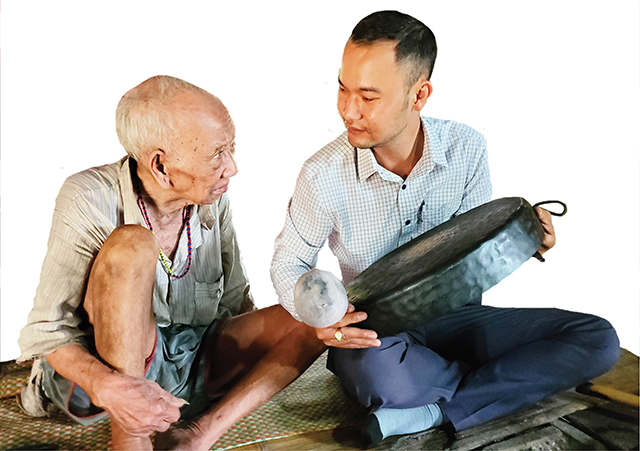
Sounds of gongs and bamboo flutes at a festival in A Luoi. Photo: L.THO
1. Just a few months ago, when seeing him feebly walking step by step up to the stage to receive the honor from the government, I intended to visit him to talk about the “flame of the forest”. Now, when many things up there have been changing, he has become “out of date” in his thoughts and on paper.
To some extent, mountains still have their own attraction. But when the light of civilization creeps into each village, something is missing in mind as well as in expectation of many people. People like him are gradually disappearing.
His memories by the extinguishing fire in the stilt house at Dien Mai Village, A Ngo Commune reminded us of the old days when the young man Quynh Hoang was roaming around mountains and forests. His footprints could be found on leaves in the forest and throughout the village.
Leaving then arriving, without stopping, he was happy with jars of can wine (straw liquor) and melodies of the mountain. He sang for people and taught them how to play the bamboo flute and the drum. The sounds he made are sometimes as melodious and deep as sounds of streams, sometimes vibrant throughout the mountain. All of them are tradition for those who live their lives on the mountain.

Mr. Quynh Hoang is talking with the author about how he adjusts the gong
Just over 5 years ago, in my conversation with him, he played those sounds for western people. They looked curious and bewildered at first, but soon immersed themselves in the rhythms of the mountain and forest.
They did not know how to describe their feelings; neither did I understand the rhythms that have entered the history of Ta Oi people. Those sounds of the mountain and forest were indispensable in ethnic people's lives in the past.
“Quynh Hoang is a treasure in the forest,” said many people and wrote many newspapers. I personally consider him a hyphen that connects the old century with the new one. From his wandering, the man who has been living throughout a century leaves for villagers a huge legacy. Besides his ability to play traditional musical instruments, he can make, play and adjust tens of different musical instruments for ethnic groups in Thua Thien Hue such as Ta Oi, Pa Co, Co Tu, etc.
“It is hard to explain, but only Quynh Hoang has such a special talent. Quynh Hoang is the only one who knows how to adjust the sound of gong. He used to teach it, but no one could do it,” said Mrs. Them.
His house was unchanged; his eyes were still warm, but his hands were weak. Despite all that, she played the gong for me.
The sounds he made were still the same as before. He pointed at the gong, motioning me to do as he did. Hearing the awkward sounds made by a man living in the plain, he smiled gently. Then he held my hands and helped me play the gong.
He is the artist of the mountain. Every time I walk towards the mountain, I naturally drop by his stilt house with thick smoke on the wooden beams to sit beside the extinguishing fire. Looking around, you will see objects recalling a son of the mountain. Gongs, thanh la, bamboo tubes, and drums are always with this one-hundred-year-old man. “Who else will keep them if I don’t?” said he in an unclear voice.
2. Amid the ups and downs of life, he offered me doat wine, a kind of alcoholic drink with which ethnic people begin their conversation. As usual, he finished his wine. “Drink it!" said he briefly when seeing my hesitance.
His face turned angry when I asked: “Do you feel sad when no one succeed you?” Suddenly I heard the sounds of modern music coming from a group of young ethnic people in their twenties. "Now they learn to play it. They don’t want to play traditional musical instruments.” His words accidentally touched upon the pain of the mountain.
Not just in this mountainous region, young people today are not interested in the culture inherited from their ancestry. They follow and accept the modern culture that older ethnic people consider luxurious and frivolous.
Only old people like Quynh Hoang still keep the soul of the ethnic village. Those things have been recognized by the government as national intangible heritage. How can people ignore them? Perhaps deep in his mind, Quynh Hoang does not really understand what heritage is, but as he said, his action is to encourage his younger generations to keep their origin.
Many festivals took place without his presence, but the long concrete road still leads people from everywhere to his simple tilt house to learn about the culture of the highland. He is still sitting there! Inside the small and skinny body is his tact and ingenuity. He is willing to teach others everything he knows despite his degrading health with time.
From the small corner in his stilt house, Quynh Hoang is like a bird flying everywhere. In A Luoi now no one can replace him. Every time there is a festival, people think of him, the one who is keeping a “treasure” of Truong Son Mountain Range in his small body, the one who makes the sounds of the mountain, and even the dreams of those who want to succeed alive.
“He is a big tree in the forest. He is the only one who can repair and adjust the musical instruments of all the 5 ethnic groups living on Truong Son. Quynh Hoang is not only well known in A Luoi, but many people in the neighboring provinces know him,” said Nguyen Thi Suu, Secretary of District Party Committee.
He is still there. His simple stilt house is still filled with memories. One day, he will be called by the Heaven, but his image will never disappear under the canopy of the forest and on the mountain paths. Behind the cup of wine I finished before leaving is the image of the old ethnic man who immerses himself in his dreams of the old days.
Quynh Hoang is the only artisan in A Luoi who was awarded the title People’s Artisan by the President. It is a precious reward by the government for those who have good conduct and talent and are contributing their large part in the conservation and promotion of the intangible heritage in Thua Thien Hue in particular and in Vietnam in general.
Story and photos: QUYNH VIEN